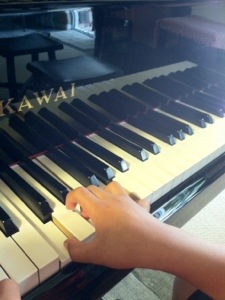How to Practice
 The following is my latest article on Music Teachers Helper:
The following is my latest article on Music Teachers Helper:
Practicing is such an important and crucial part of music study. Many students, however, don’t know how to practice, or how to practice effectively and efficiently. I am constantly finding myself reminding students how to practice or what they should do when they practice. Sometimes what I have to say is so blatantly obvious to me, that I forget that students don’t always know these things, especially transfer students that are new in my studio. The following are my most frequently given tips to students to help them practice better:
1. Practice with the score – Obvious, right? You would be surprised how many students don’t do this! The most common excuse is “but I have already memorized the piece.” Well, students usually “think” they have memorized the music when they can more-or-less play their piece from beginning to end, but most often than not, they still make many mistakes. They keep practicing, but the mistakes do not get fixed? Why? They keep practicing from memory! I recently discovered that sometimes parents are the ones taking the music away, thinking the students don’t need the music anymore because “they have memorized it.” I also discovered that some students/parents think it is better to perform in a recital from memory, with many mistakes here and there, even though they can do a better job with the score. This is such a common misconception! Obviously, if one is playing in a competition or an exam where memory playing is mandatory, then one must play from memory. Otherwise, just use the score and play good, rather than try to look good by not using the score and play bad! If one wants to look good by performing from memory AND play good, then one must practice a lot, with the score! It never ceases to amaze me how many students do not realize this. A while ago I made a video on this topic so I can just direct students to the video without having to explain the same things over and over!
2. Practice with the correct fingering – Also obvious, right? If only students will follow the correct fingering on the page! Most of the time, correct fingering is what is printed on the page, but occasionally teachers can find alternative/better fingering to suit the particular student/situation. Until students learn to find the most natural, effortless and logical fingering on their own, they need to just follow the book or the teacher’s markings. If only I get a dollar every time a student commits the “fingering crime”!
3. Practice hands separately – Another obvious solution to bad playing. Students don’t like to do this, as it is labor intensive, and “it doesn’t sound good with just the left hand” or “it is too hard to play just the left hand!”
4. Practice slowly – Again so obvious to us teachers, but many students don’t do it! Most common excuse: “It says Allegro on top” or “It is supposed to be a fast piece.” Sometimes I try to make a point when students play fast and make many mistakes, I ask them to play extremely slowly, and I am not surprised if they actually get so lost that they can not play at all. My reply is “if you can drive at 70 miles per hour, surely you can drive at 20 miles per hour, too, if not, then you didn’t know how to drive to begin with!”
5. Practice with the metronome – You would be surprised how many students don’t have one. Most people have a smart phone nowadays, and there are many cheap/free metronome apps. No more excuse!
6. Practice from the end – Many students, especially beginners, like to practice from the beginning of their piece. They sound good at first, then it gets worse and worse. This tip also includes practicing from various different sections in the piece, instead of always the beginning.
7. Practice difficult sections first – This tip also includes practicing the most difficult piece in the student’s repertoire first, followed by revision of familiar material. The first part of any practice session is the most productive part, it is when the student is most focused, so that time should be devoted to practicing the tricky parts or newest pieces. Very obvious, right? Again some students need to be told this, or they always start their practice session with their most favorite old piece that they can already do very well and by the time they get to the newest assignment, they are tired!
What tips do you give to your students to help them practice better? I would love to hear them!

I also like to watch the piece played on You Tube before and after I practice it. Sometimes I watch a pianist play, sometimes I follow the sheet music. Sometimes what I initially practiced is nothing like how it should actually sound.
But watching it helps me progress faster than I otherwise would.
All that being said – Nothing takes the place of qualified instruction from someone as great as Yiyi Ku. Thanks for taking me on as a student.
Wayne
Wayne,
Thanks for commenting, and for sharing your thoughts. Yes, watching and listening to other performers is very beneficial. When I was a student, I took every opportunity I had to attend live concerts and recitals. Often I would only be able to afford the cheapest of tickets, but the music was always priceless! When we listen to others, we are not trying to imitate their playing, but to see the work through another artist’s mind and help form our own understanding of the composer’s intentions. You are a great student, and I have enjoyed working with you!
Seek understanding. Have fun.